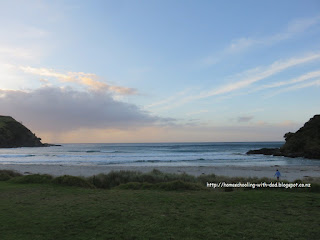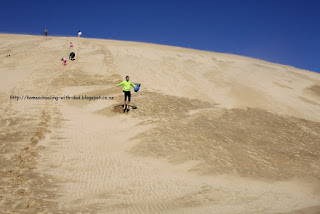When we started consciously working on this in March, when Miya was 5 1/2, she was pretty much completely a non-reader. I think I am right to say:
- She could easily recognise and write all the letters.
- She could copy out words written down, or write words when the letters were told to her.
- Maybe about half the time she knew individual letter sounds (but no letter combination sounds).
- She could recognise and write a few words, such as our names and "cat" and dog".
I decided that I would get Miya to read aloud to me each day, for about 15 to 30 minutes, starting with the simplest leveled readers and working our way up.
The leveled readers we chose first were these Reader Rabbit ones:
The first story used only eight different words -- see, I, Sam, look, at, this, book, me -- and each story after that introduced a few more words.
It wasn't long before we got into a routine of reading five stories each day, introducing one new story and dropping one old story. We tried to read every day, but sometimes missed the occasional day.
This reader series, which we finished last month, was very successful. Miya really enjoyed the stories (she seems to prefer stories with talking animals), which were funny and interesting, and it jumped her into reading in a way that gave her lots of confidence to continue.
On finishing that series, we have gone through our bookshelves starting with the simplest books and working our way up. Most of the books we have aren't specifically leveled readers, though we do have quite a few of the Oxford Reading Tree Biff, Chip & Kipper readers, which are excellent.
To give an idea of where we are currently at, yesterday's new book was Put Me in the Zoo. For the most part Miya read it all correctly, with just a few hesitations and one or two unknown words (she didn't know "violet", and I had to sound it out for her). I expect that by tomorrow she will be reading it all very smoothly.
What I find interesting about Miya's way of learning to read is that she is still fairly slow at sounding out unknown words. It is not something that she would immediately do, and it is only something that she is starting to do now as a consequence of me reminding her every time.
She actually seems faster at learning words from me telling them to her. And it doesn't seem to matter whether new words are told to her directly or whether we spend a bit of time sounding them out together first. Generally by the third time she has read a new word in a story she can remember it smoothly.
I am not sure what to think of this. Sometime it is clear that she is just memorising the story and reciting it back to me rather than reading the words. So, I need to keep changing the books and introducing new stories. I worry that the way she is learning words will make it difficult for her to learn independently when she encounters new words. But on the other hand she seems to be progressing very well, learning using her own method.
It is all very different from the way that Mulan learnt to read.
I always felt that I never specifically taught Mulan to read; it just sort of happened. At no time did we ever work through leveled readers, and nor did I sit alongside her teaching her words.
When Mulan was 5 years 2 months, I wrote here:
I get the sense that Mulan is about 80 to 90% correct in reading most common three and four letter words.By that time Mulan was regularly teaching herself new words by sounding them out independently. With longer words she still struggled a bit, as she missed parts and so interpreted them as similar sounding shorter words.Five letters and up are a bit too long for her—she will generally read them as some three or four letter word that has similar spelling.
Her self-teaching by sounding out words continued, and by the time Mulan was five and a half she was reading simple picture books aloud to two-year-old Miya. When Mulan was six and a quarter, I wrote here that she could independently read the Frances books. And when Mulan was six and a half I wrote here that she was independently reading Enid Blyton's The Enchanted Wood.
Two different children, and two very different ways to learn to read.




















